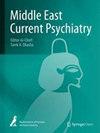Evaluation of the psychometric properties and convergent validity of the Alcohol, Smoking and Substance Involvement Screening Test (ASSIST) questionnaire in Brazilian young adults
IF 1.6
Q3 PSYCHIATRY
引用次数: 0
Abstract
This cross-sectional study aims to evaluate the psychometric properties and the convergent validity of the Alcohol, Smoking and Substance Involvement Screening Test (ASSIST). Confirmatory factor analysis (CFA) and linear regression adjusted for confounding factors were performed to obtain the adjusted beta value (βadj) for sleep quality (Pittsburgh Sleep Quality Index), burnout (Copenhagen Burnout Inventory), and depressive symptoms (Patient Health Questionnaire-9). The study population consisted of 3187 young adult university students. The CFA indicated adequate fits for the one- and two-factor structure of the ASSIST, with better indices for the two-factor model. Convergent validity results confirmed the best fit of the one-factor model (version 3.1), in which individuals classified as “suggestive of dependence” showed a greater effect on worse sleep quality (βadj 2.16, 95% confidence interval (CI) 1.48–2.84), burnout (βadj 12.25, 95% CI 8.43–16.06), and depressive symptoms (βadj 6.69, 95% CI 5.37–8.00). The results and the literature review indicated that the one-factor presents an adequate factor structure and better convergent validity.评估巴西青壮年酗酒、吸烟和滥用药物筛查测试(ASSIST)问卷的心理测量特性和收敛有效性
这项横断面研究旨在评估酗酒、吸烟和药物依赖筛查测试(ASSIST)的心理测量特性和收敛效度。研究人员对睡眠质量(匹兹堡睡眠质量指数)、职业倦怠(哥本哈根职业倦怠量表)和抑郁症状(患者健康问卷-9)进行了确认性因素分析(CFA)和线性回归,并对混杂因素进行了调整,以获得调整后的β值(βadj)。研究对象包括 3187 名青年大学生。CFA结果表明,ASSIST的单因素和双因素结构拟合充分,双因素模型的指数更好。收敛效度结果证实了单因素模型(3.1 版)的最佳拟合,其中被归类为 "暗示依赖 "的个体对睡眠质量(βadj 2.16,95% 置信区间 (CI) 1.48-2.84)、职业倦怠(βadj 12.25,95% CI 8.43-16.06)和抑郁症状(βadj 6.69,95% CI 5.37-8.00)的影响更大。研究结果和文献综述表明,单因素模型具有适当的因素结构和较好的收敛效度。
本文章由计算机程序翻译,如有差异,请以英文原文为准。
求助全文
约1分钟内获得全文
求助全文
来源期刊

Middle East Current Psychiatry
Medicine-Psychiatry and Mental Health
CiteScore
3.00
自引率
0.00%
发文量
89
审稿时长
9 weeks
 求助内容:
求助内容: 应助结果提醒方式:
应助结果提醒方式:


